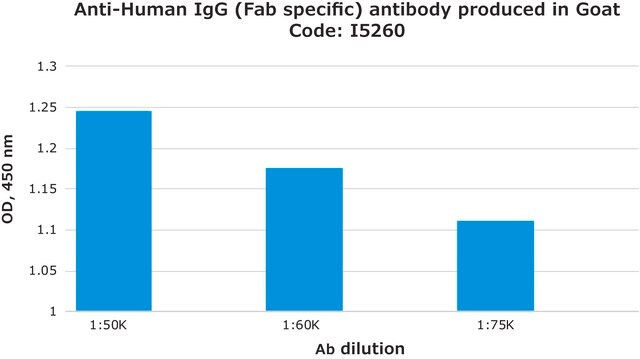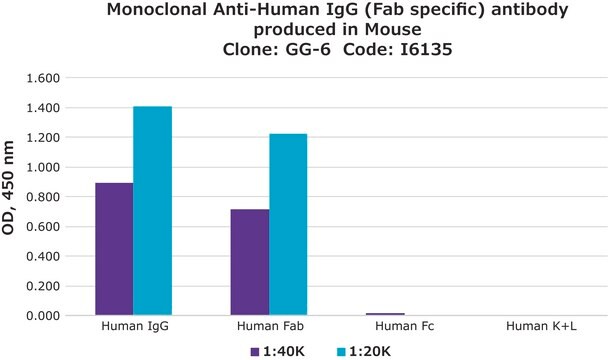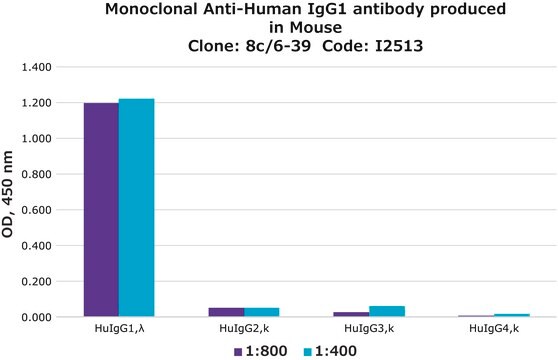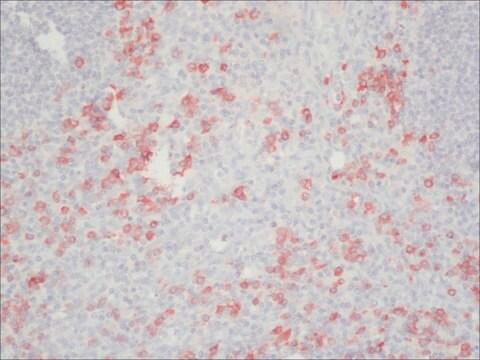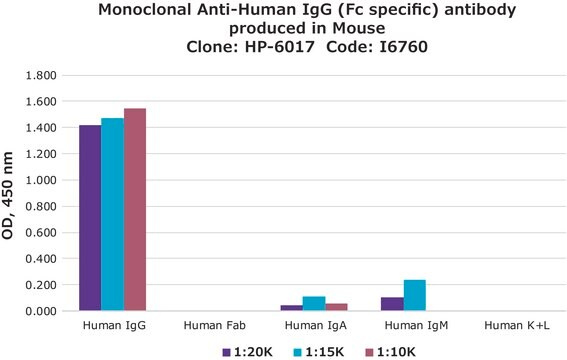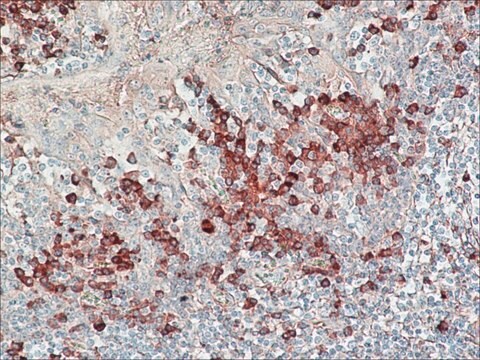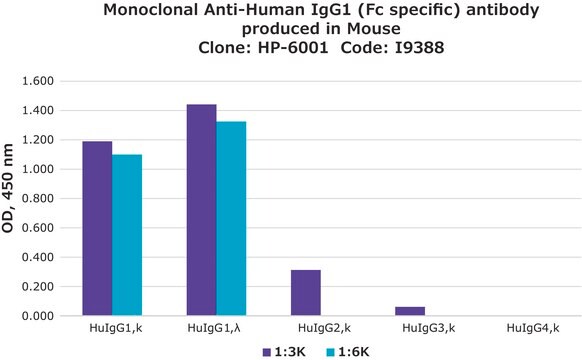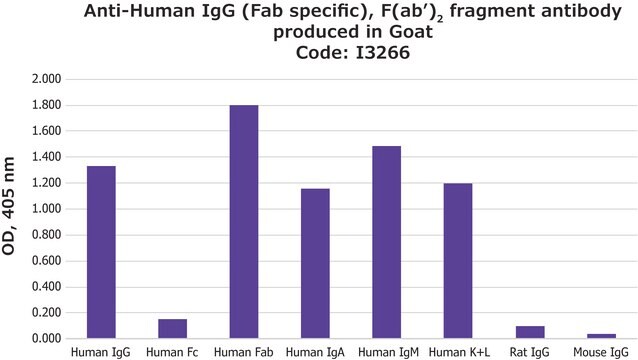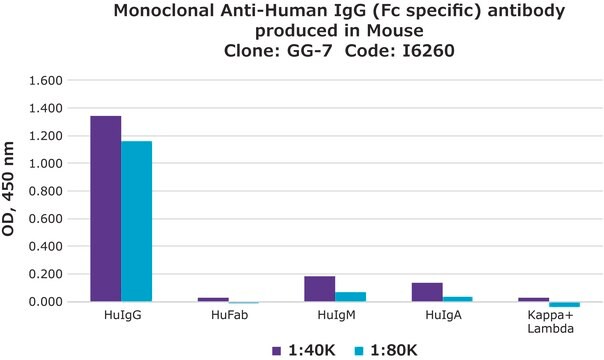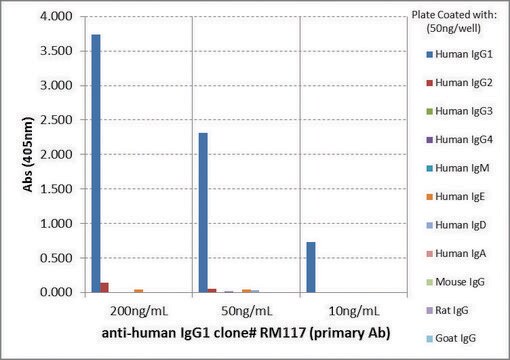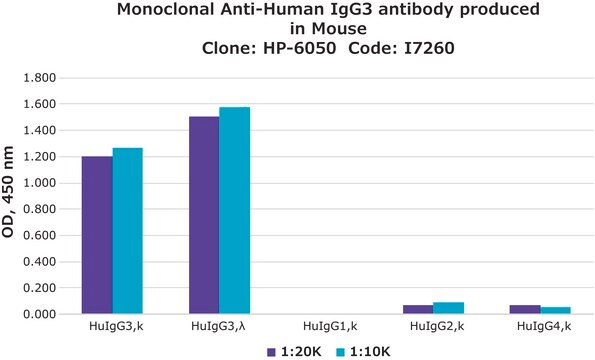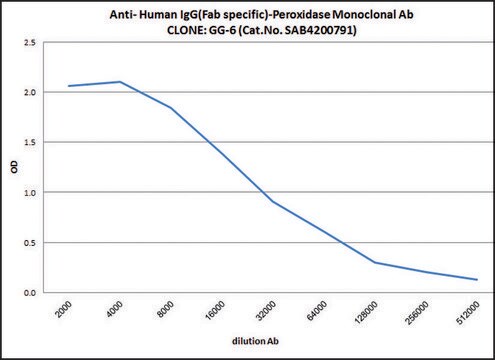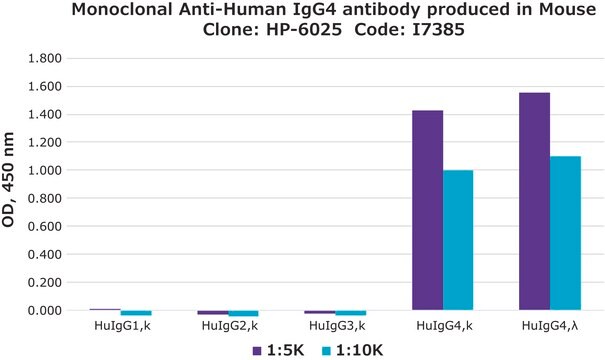I5385
Monoclonal Anti-Human IgG1 (Fab specific) [G1m(f)] antibody produced in mouse
clone SG-16, ascites fluid
Se connecterpour consulter vos tarifs contractuels et ceux de votre entreprise/organisme
About This Item
Produits recommandés
Source biologique
mouse
Niveau de qualité
Conjugué
unconjugated
Forme d'anticorps
ascites fluid
Type de produit anticorps
secondary antibodies
Clone
SG-16, monoclonal
Contient
15 mM sodium azide
Technique(s)
indirect ELISA: 1:5,000
Isotype
IgG1
Conditions d'expédition
dry ice
Température de stockage
−20°C
Modification post-traductionnelle de la cible
unmodified
Description générale
Monoclonal Anti-Human IgG1 (mouse IgG1isotype) is derived from the hybridoma produced by the fusion of mouse myeloma cells and splenocytes from an immunized mouse. Human IgGs are glycoprotein antibodies that contain two equivalent light chains and a pair of identical heavy chains. IgGs have four distinct isoforms, ranging from IgG1 to IgG4.
Immunogène
Purified human IgG
Application
Monoclonal anti-Human IgG1 may be used for the identification of human IgG1 subclass by means of various immunoassays. It can be used in direct hemagglutination (HA) and hemagglutination inhibition (HAI) assays, immunofluorometric assay (IFMA) and detection of cytoplasmic IgG. Monoclonal anti-human IgG1 has been used in enzyme linked immunosorbent assay (ELISA).
Actions biochimiques/physiologiques
Human IgGs regulate immunological responses to allergy and pathogenic infections. IgGs have also been implicated in complement fixation and autoimmune disorders This product clone recognizes the G1m(f) allotype and has been established as a useful human IgG1 specificity standard by the WHO/IUIS study.
Clause de non-responsabilité
Unless otherwise stated in our catalog or other company documentation accompanying the product(s), our products are intended for research use only and are not to be used for any other purpose, which includes but is not limited to, unauthorized commercial uses, in vitro diagnostic uses, ex vivo or in vivo therapeutic uses or any type of consumption or application to humans or animals.
Vous ne trouvez pas le bon produit ?
Essayez notre Outil de sélection de produits.
Code de la classe de stockage
10 - Combustible liquids
Classe de danger pour l'eau (WGK)
nwg
Point d'éclair (°F)
Not applicable
Point d'éclair (°C)
Not applicable
Faites votre choix parmi les versions les plus récentes :
Déjà en possession de ce produit ?
Retrouvez la documentation relative aux produits que vous avez récemment achetés dans la Bibliothèque de documents.
Les clients ont également consulté
Allotype analysis to distinguish the origin of varicella-zoster virus immunoglobulin G after allogeneic stem cell transplantation
Yamazaki R, et al.
Biology of Blood and Marrow Transplantation : Journal of the American Society For Blood and Marrow Transplantation, 19(7), 1013-1020 (2013)
Andreas Lossius et al.
Annals of clinical and translational neurology, 4(10), 756-761 (2017-10-20)
Immunoglobulin gamma (IgG) heavy chain genes are associated with susceptibility to multiple sclerosis (MS) and IgG levels in the cerebrospinal fluid (CSF). However, how these variants are implicated in disease mechanisms remains unknown. Here, we show that proliferating plasmablasts expressing
Recurrence of monoclonal gammopathy associated with donor-derived myelodysplastic syndrome after cord blood stem cell transplantation
Yamazaki R, et al.
Experimental Hematology, 39(12), 1119-1123 (2011)
Virginie Martin et al.
Veterinary research, 45, 69-69 (2014-06-27)
Control of canine leishmaniasis is an important objective for the benefit of dogs living in or visiting endemic areas and for public health because of the zoonotic nature of this disease. Resistance or susceptibility to developing canine leishmaniasis after exposure
Rie Yamazaki et al.
Experimental hematology, 39(12), 1119-1123 (2011-09-14)
Myelodysplastic syndrome (MDS) is known to be associated with functional abnormalities of B cells, including hypergammaglobulinemia and monoclonal gammopathy (MG). However, the pathogenesis of these immunological disorders has not been clarified. We report a patient who developed donor-derived MDS followed
Notre équipe de scientifiques dispose d'une expérience dans tous les secteurs de la recherche, notamment en sciences de la vie, science des matériaux, synthèse chimique, chromatographie, analyse et dans de nombreux autres domaines..
Contacter notre Service technique